

Spring by Ali Smith review – a beautiful piece of synchronicity. Bawling for books: which titles make you cry? On the Culture desk we have talked about the films that have had us tearing up, and the songs we’ve sniffed along to (which prompted the ever excellent headline “tracks of our tears”).
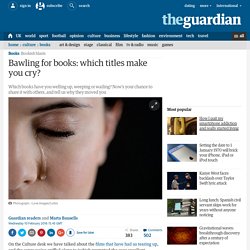
After recent hit A Little Life got readers wondering how their bodies could produce so many tears, it’s now time for books. Which titles have made you cry? Readers of the Tips, links and suggestions community shared some of theirs recently, as did our Twitter followers. Let us know yours in the comments, and we’ll publish a selection. Aussie bookshop delivers blind dates with books! 3 Things Students Desire to Hear From Teachers. "Every child needs at least one adult who is irrationally crazy about him or her.
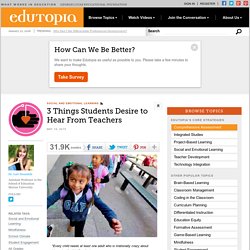
" - Urie Bronfenbrenner A year and a half ago, I decided that I needed to return to the K-12 classrooms and really experience ground-level teaching, testing, core standards, differentiating, and emotionally connecting with children and adolescents in ways I had not for many years. I have been and still am an assistant professor in the school of education at Marian University, but the environments, experiences, and my own learning have grown and changed immensely from returning to the classroom 18 months ago. I asked the university for a course release, taking the lectures, research, and strategies into the early adolescent grades.
The reading debate: how do we create readers? As a teacher librarian and a mother of two young children, this topic is a passion of mine (along with most teacher librarians in my acquaintance).
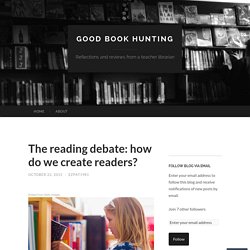
How to use search like a pro: 10 tips and tricks for Google and beyond. Search engines are pretty good at finding what you’re looking for these days, but sometimes they still come up short.

For those occasions there are a few little known tricks which come in handy. So here are some tips for better googling (as it’s the most popular search engine) but many will work on other search engines too. 1. Exact phrase The simplest and most effective way to search for something specific is to use quote marks around a phrase or name to search for those exact words in that exact order. For instance, searching for Joe Bloggs will show results with both Joe and Bloggs but not necessarily placed sequentially. The exact or explicit phrase search is very useful for excluding more common but less relevant results.
The power of two: twins in literature. In the final scene of Twelfth Night, when the resemblance between fraternal twins Sebastian and Viola is discovered, Antonio can barely contain his astonishment.
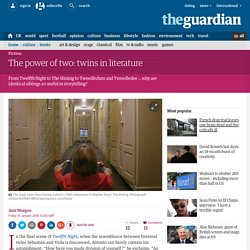
“How have you made division of yourself?” He exclaims. “An apple, cleft in two, is not more twin / Than these two creatures.” Many of us share Antonio’s fascination – and writers are no exception. The Author Elizabeth Strout on ‘Lucy Barton’ and How Her Characters Come Into... Scientists Pat and Peter Shaw died in a... - The Sydney Morning Herald.
How to Disagree Without Being Disagreeable: 7 Tips for Having More Productive... George S.

Patton once said: "If everyone is thinking alike, then somebody isn't thinking. " In business, stirring the proverbial pot can be a good thing. And while negotiating these matters can be challenging -- especially when they involve our teammates or bosses -- differences in opinion will often lead to progress. The most important thing to remember is that there is a big difference between healthy, productive disagreements and heated arguments. David Bowie’s Formative Reading List of 75 Favorite Books.
Creativity is a combinatorial force — it rests on our ability to fuse, usually unconsciously, existing concepts, memories, bits of information, pieces of knowledge, and fragmentary impression into novel ideas that we call our own.
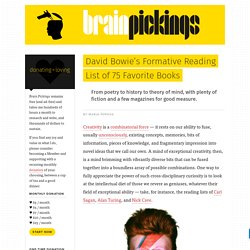
A mind of exceptional creativity, then, is a mind brimming with vibrantly diverse bits that can be fused together into a boundless array of possible combinations. One way to fully appreciate the power of such cross-disciplinary curiosity is to look at the intellectual diet of those we revere as geniuses, whatever their field of exceptional ability — take, for instance, the reading lists of Carl Sagan, Alan Turing, and Nick Cave. Naturally, I was thrilled to come across the itemized intellectual diet of one of the most celebrated creative icons in modern history, David Bowie. Rebecca Foster (Reading, The United Kingdom)'s review of Empathy.
(3.5) Of Krznaric’s pop-philosophy writing, I would highly recommend The Wonderbox.
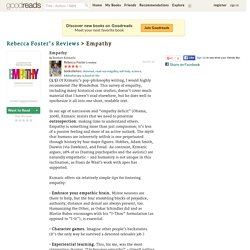
This survey of empathy, including many historical case studies, doesn’t cover much material that I haven’t read elsewhere, but he does well to synthesize it all into one short, readable text. In our age of narcissism and “empathy deficit” (Obama, 2008), Krznaric insists that we need to prioritize outrospection: making time to understand others. Empathy is something more than just compassion; it’s less of a passive feeling and more of an active outlook. The myth that humans are inherently selfish is one perpetuated through history by four major figures: Hobbes, Adam Smith, Darwin (via Dawkins), and Freud. Au contraire, Krznaric argues; 98% of us (barring psychopaths and the autistic) are naturally empathetic – and humanity is not unique in this inclination, as Frans de Waal’s work with apes has supported.
Krznaric offers six relatively simple tips for fostering empathy: • Embrace your empathic brain. University of Adelaide is phasing out lectures. By Tim Dodd Lectures are obsolete, says University of Adelaide vice-chancellor Warren Bebbington.
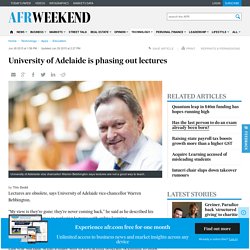
"My view is they're gone; they're never coming back," he said as he described his university's experience in replacing lectures with online learning. If students can get the material online, they are not going to come to lectures, he said. Last year Adelaide began a major shift in its teaching program, beginning to phase out traditional lectures and replacing them with online learning integrated with small-group work. The aim in the initial year was for every first-year student to have at least one small-group discovery experience, Professor Bebbington said. He considers it a success. The small-group experiences are what it known as "blended learning" or "flip the classroom" – a new style of teaching that many universities worldwide are experimenting with.
Instead of sitting in lecture theatres to learn the basic material, students learn it in online courses. 22 Powerful Closure Activities. Too many university supervisors and administrators criticize the absence of lesson closure, a dubious assessment practice likely caused by the improper use of Madeline Hunter’s lesson plan model (PDF) as a de facto checklist of eight mandatory teaching practices -- anticipatory set, objective and purpose, input, modeling, checking for understanding, guided practice, independent practice, and closure -- a custom that Hunter decried in 1985 (PDF).
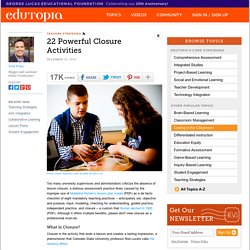
Although it offers multiple benefits, please don't view closure as a professional must-do. What Is Closure? Closure is the activity that ends a lesson and creates a lasting impression, a phenomenon that Colorado State University professor Rod Lucero calls the recency effect. Teachers use closure to: Check for understanding and inform subsequent instructionEmphasize key informationTie up loose endsCorrect misunderstandings Students find closure helpful for: Creative Closure Activities 1. Behavior Expectations and How to Teach Them. Imagine that a student enters an English class to find that it's that most dreaded of days -- graded paper pass-back day. As he receives his paper, his teacher begins to criticize him for his mistakes saying, "You should have known better than to write your thesis that way.
" What if the teacher went on to add, "That's the third time this month. What am I going to do with you? " 16 Professional New Year's Resolutions You Should Actually Keep. For many, New Year's resolutions often feel like a forced, trite way to make a change. After all, if you really wanted to change, why would you wait around for January First? You'd be better off just making sporadic changes throughout the year, right? Well, that strategy doesn't always pan out like we'd like it to. Waiting until you "feel ready" to change often enables you to push aside goals that are important, but not time-sensitive. 5 Highly Effective Teaching Practices. I remember how, as a new teacher, I would attend a professional development and feel inundated with new strategies. (I wanted to get back to the classroom and try them all!)